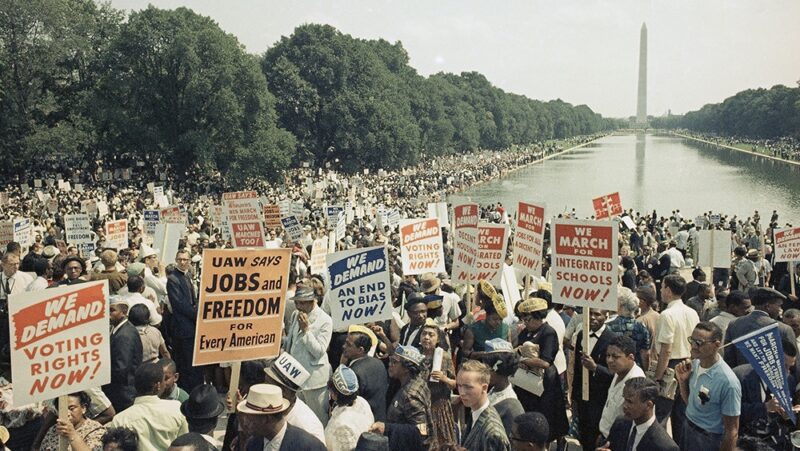Campus Protests 1 Year Into Israel-Hamas War: Where America Stands

A year after war broke out between Israel and Hamas, Americans are wrestling with the First Amendment and how college students protesting the war are using those freedoms.
Freedom Forum's annual “The First Amendment: Where America Stands” survey polled 820 people in late July and early August 2024, just as many students were returning to campuses. The survey revealed that while most Americans support students’ rights to speak out and protest, there are limits to that support, particularly when it makes students feel unsafe and disrupts the educational process. The key findings say:
- Most Americans (72%) support students' rights to peacefully assemble and express their thoughts through protest, but not when campus buildings are occupied or when encampments are built.
- Six in 10 Americans (61%) agree that college campuses should foster a free exchange of ideas, even if they are offensive to some. That is down from 66% in 2023. Interestingly, Gen Z participants, which would include many college students, are less likely to agree with that statement than other generations. And Black (54%), Hispanic (55%) and Asian American respondents (52%) were less likely to agree than white Americans (64%).
- Nearly half (49%) say campuses need to crack down on protests because they undermine education and make students feel unsafe, but 21% disagree and 30% weren’t sure.
- Though not specific to campus protests, half (51%) of Americans say that organizers of a protest or demonstration should be held liable if violence occurs, regardless of who caused it.

Overall, the campus protests may have raised some literacy around First Amendment issues. Nearly half of Americans (45%) realize the First Amendment applies differently to public and private universities, as compared to only 23% who understand that the First Amendment doesn’t apply to private workplaces.
What sparked the protests and what was their impact?
On Oct. 7, 2023, Israel launched a war in Gaza after Hamas, the militant Palestinian group that governs Gaza, attacked Israel, killing 1,139 people and taking 251 hostages.
Students at campuses large and small protested, some supporting Israel, others protesting attacks on the Palestinian people. Protesters at some schools started encampments and occupied buildings, demanding an end to the war and in some cases, limits on universities’ investments in companies that make weapons. Arrests of demonstrators and journalists made headlines. Some colleges changed their policies on campus demonstrations as a result.

Among the questions raised by the protests: When can a protest be shut down or protesters punished by a public university without violating the First Amendment? What are the limits on hateful speech, and what, if anything, can administrations do to protect students from it? Can schools clear or outright ban encampments?
RELATED: Protesting on college campuses: FAQs answered
How does the First Amendment play out on college campuses?
The First Amendment prevents the government from limiting a person’s right to speak out, express their deepest beliefs, publish their thoughts, gather with like-minded people and petition the government for change.
In the case of student protests, those protections from government interference depend on whether the campus is a public university – and thus, protected by First Amendment freedoms – or a private university, which can set its own rules. Some private universities embrace the standards set by the First Amendment.
Public universities can limit the time, place and manner of protests, as long as those limits aren’t intended to stop the protest entirely and are applied to all viewpoints equally.
During the 2023-’24 protests over the Israel-Hamas War, students at more than 150 universities in 35 states erected more than 1,100 encampments, according to Princeton University’s Bridging Divides Initiative. Some students occupied campus buildings, refusing to leave until their demands were met.
The encampments limited access to some parts of campuses for students and faculty, and some schools called in police to break them up.

There is no First Amendment protection for encampments or taking over campus buildings. The First Amendment does not protect conduct such as vandalism, trespassing and violence. Universities also have an obligation to protect students from illegal harassment that violates Title VI of the Civil Rights Act. In addition, certain types of speech are not protected by the First Amendment, including incitement to imminent lawless violence, true threats and fighting words.
Free speech, hate speech and controversial speakers
In addition to concerns about encampments and occupied buildings, much of the debate over the campus protests focused on speech between opposite sides of the debate that some felt veered into antisemitic or anti-Muslim speech. The First Amendment even protects speech that many find to be offensive, including hate speech.
However, when asked if the First Amendment should protect hate speech, 42% of Americans surveyed said no.
RELATED: Free speech on college campuses: The ultimate guide
And more than a third of Americans (36%) say preventing hate speech is more important than protecting free speech. That overall number has stayed about the same since the 2020 “Where American Stands” survey.
Black (49%), Hispanic (39%) and Asian Americans (48%) felt more strongly about preventing hate speech than white respondents (32%).
In a true/false survey question, 83% of respondents answered correctly that students had a right to protest controversial speakers. That right, however, does not include shouting down the speaker, or the “heckler’s veto.” Preventing a person who has a permit or other permission to speak from being heard is a violation of the First Amendment, unless the speaker is urging listeners to imminent lawless action.
This report is compiled from Freedom Forum’s 2024 “The First Amendment: Where America Stands” survey and other previously published content. The editor is Patty Rhule.
10 Freedom of Speech Examples You Need to Know
20 of the Most Famous Protests In U.S. History
Related Content
2025 Al Neuharth Free Spirit and Journalism Conference
All-Expenses-Paid Trip To Washington, D.C.
June 22-27, 2025
Skill-Building
Network Growing
Head Start On Your Future

